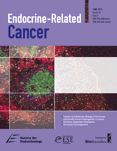Forkhead box-O transcription factor: critical conductors of cancer's fate
- Division of Endocrinology and Diabetology, Department of Internal Medicine, University of Leipzig, Philipp-Rosenthal-Strasse 27, D-04103 Leipzig, Germany
- (Correspondence should be addressed to D Fuhrer; Email: fued{at}medizin.uni-leipzig.de)
Abstract
Cells have evolved elaborated mechanisms to coordinate the cellular answer of either survival or apoptosis. Recent concepts of human carcinogenesis have suggested disturbances in these cellular relays as a potential link to cellular dedifferentiation and uncontrolled proliferation. Forkhead box-O transcription factors (FOXOs) play an important role in tumour suppression by regulating the expression of genes involved in stress resistance, DNA damage repair, cell cycle arrest and apoptosis. The specific regulation of FOXO function is tightly controlled by posttranslational modifications such as phosphorylation, acetylation and ubiquitination. Loss of FOXO function has recently been identified in several human cancers. In this review, we will give an overview about recent progress in the understanding of function and regulation of FOXOs, as well as their role in carcinogenesis. Furthermore, we will discuss a potential clinical use of FOXOs by therapeutically restoring their tumour suppressive properties.
- © 2008 Society for Endocrinology













